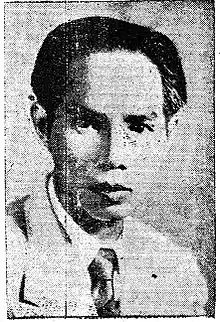Phan Văn Hùm
Phan Văn Hùm (9 April 1902 – 1946) was a Vietnamese journalist, philosopher and revolutionary who, from 1930, participated in the Trotskyist left opposition to the Communist Party of Nguyen Ai Quoc (Ho Chi Minh).[1]

He was born in the village of An Thanh, French Cochinchina (Southern Vietnam). His father was an educated Buddhist and a small landowner. In the early 1920s he worked as a technician in Huế where he was a frequent visitor to veteran nationalist and anti-colonial campaigner Phan Bội Châu, then under house arrest as the founder of “Vietnamese Restoration League” (Việt Nam Quang Phục Hội).[2]
In Saigon Phan Văn Hùm befriended the charismatic publicist Nguyen An Ninh. Together they travelled the countryside, spreading ideas of liberation among the peasants. They were arrested and confined to Saigon's Maison Centrale, the "Colonial Bastille".[3] His account of their ordeal[4] was serialised in the paper Than Chung and widely circulated among patriotic youth.[5]
In September 1929 he left for France. In Paris he met Tạ Thu Thâu who had clashed with Moscow-aligned Communists from the very outset of his political engagement in Paris. He accused "salaried Annamites of the Colonial Commission of the French Communist Party" of infiltrating his party, the Annamite Independence Party (An Nam Độc lập Đảng), in order to turn members into "puppets carrying out the Communist Party's dictates." If the oppressed of the colonies" were to secure their "place in the sun," Tạ Thu Thâu argued they would have to "unite against European imperialism--against Red imperialism as well as White." Following a public protest in front of the Élysée Palace over the execution of the leaders of the Yên Bái mutiny on 22 May 1930, Phan Văn Hùm went underground with Hồ Hữu Tường. In July 1930 they formed an Indochinese Group within the Communist League (Lien Minh Cong San Doan), the French section of the International Left Opposition (its members were systematically expelled by the Comintern).[6][5]
In 1933 Phan Văn Hùm was reunited with Tạ Thu Thâu and Hồ Hữu Tường in Saigon. He worked with them in the united front with the "Stalinists" (the then Indochinese Communist Party) around the paper La Lutte. In the April 1939 Colonial Council elections he ran successfully with Tạ Thu Thâu on a "Workers and Peasants" slate against the "defense of Indochina within the framework of French imperialism and national [i.e. cross-class] unity," defeating both the "bourgeois" Constitutionalists and Communist Party's "Democratic Front". For having campaigned against war loans and war taxes, he was sentenced to five years' hard labor and ten-year restricted residence. He spent three years,[7] in the Côn Đảo island prison, Poulo Condore (where his old prison comrade Nguyen An Ninh died in 1943), from 1939 to 1942.[5]
During the war years Phan Văn Hùm had two works of philosophy published in Hanoi: on Buddhist philosophy (Phat Giao Triet Hoc, 1942); and on the neo-Confucian master Wang Yangming (Vuong Duong Minh, Than The Va Hoc Thuyet, 1944).
After the surrender of the occupying Japanese in August 1945, the Communist Vietminh provisional government in Saigon offered Phan Văn Hùm a post (he had been a popular figure ever since the publication of his prison experiences in 1929). He refused, and met the fate of most of his comrades who had formed themselves as the International Communist League (Vietnam), or less formally as The Fourth Internationalist Party (Trang Cau De Tu Dang).[8] According to his comrade Ngo Van, who in later exile was to be the chief witness and historian of the Trotskyist movement in Vietnam, Phan Văn Hùm survived the massacre of his comrades in October 1945 at the Thi Nghe bridge by French and British troops. Later, in the same month, he was hunted down by the Vietminh security led by Dương Bạch Mai, with whom he had originally collaborated on La Lutte,[9] and executed.[5]
List of Works[5]
- Ngoi Tu Kham Lon (In the Central Prison), Saigon 1929
- May Duong To (A Few Poems)
- Sa Da Du Tu (Journal of a Wanderer: Impressions of Life and Travel in France), published in Than Chung. Bien Chung Phap Pho Thong (Dialectics Made Easy), Saigon 1939.
- Ngueyn Phi Hoanh (pseudonym), Tolstoy, Saigon 1939.
- Phật giáo triết học (Buddhist philosophy), Hanoi 1942.
- Vuong Duong Minh, Than The Va Hoc Thuyet (The Life and Teaching of Wang Yangming), Hanoi 1944.
- Ngồi tù Khám Lớn, lần 2, (Second prison memoir). Dân tộc, 1957
References
- Justin Corfield Historical Dictionary of Ho Chi Minh City 2013 p242 "Phan Văn Hùm - "A journalist and revolutionary, he was born on 9 April 1902 in the village of An Thanh, in what is now the province of Binh ... Teaching English in Toulouse, he was involved in the Fourth Communist International, and after having to leave ...Teaching at Ecole Paul Doumer, he was elected to the Saigon Municipal Council, and was re~elected in 1939. He was arrested and sentenced to three years in jail, being taken to Poulo Condore. Released in 1942, he was killed during the"
- "Phan Boi Chau, Vietnamese Patriot". britannica.
- Peter Zinoman, The Colonial Bastille: A History of Imprisonment in Vietnam, 1862-1940 University of California Press, 2001
- Phan Van Hum, Ngồi tù Khám Lớn (In the Maison Centrale), Saigon, 1929
- Van, Ngo (2010). In the Crossfire: Adventures of a Vietnamese Revolutionary. Oakland CA: AK Press. pp. 155–159. ISBN 9781849350136.
- Hue-Tam Ho Tai, Radicalism and the Origins of the Vietnamese Revolution, Harvard University Press, Cambridge MA. 1996, p. 242
- Nguyễn An Ninh (Version anglaise) https://www.vietnammonpaysnatal.fr/nguyen-ninh-version-anglaise/
- Archimedes L. A. Patti, Why Viet Nam?: Prelude to America's Albatross, University of California Press, 1982, pp. 522-523
- Alexander, Robert J. International Trotskyism, 1929-1985: A Documented Analysis of the Movement. Durham: Duke University Press, 1991. pp. 961-962